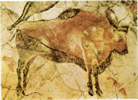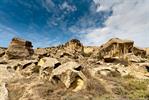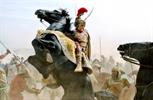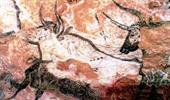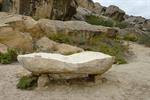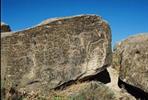The Caucasus region is one of the great cradles of humanity. Remarkable recent research suggests that the Biblical Garden of Eden was less metaphorical than previously assumed. Archaeologist David Rohl has traced numerous geographical references in the book of Genesis to real places in southern Azerbaijan, postulating the vale of 'Eden' as the Aji chai valley around modern Tabriz and placing the Land of Nod around Ardebil. There were, however, many other communities of proto-humans, notably around Mingachevir, in Karabagh (where some especially ancient remains have been recovered at the Azikh Cave) and on the Caspian coast at Gobustan. The famous Gobustan rock carvings span millennia from early Stone Age until well into the Iron Age as recorded by the changing nature of tools used to scratch animal and shamanist designs on the cave walls.
On the Absheron peninsula, archaeologists suggest that 6000 years ago, remarkably advanced men were building conical homes around a hollow central pillar that acted as fireplace and chimney for flaming gas vents which they harnessed for cooking and heat. From the ancient rocky grooves of wheel-less 'cart' tracks found near Turkan it seems they did some pretty heavy moving too.
Early kingdoms
Until well into the first millennium BC, most recorded regional history focuses on southern Azerbaijan (now Iran), here the state of Zamoa, centred near Lake Urumiyeh, fought periodic battles with the Assyrian empire to whose rule it capitulated around 815 BC. Other kingdoms - Manae, Urattu and Medea - came and went and Azerbaijan was eventually incorporated into Akhaemenid dynasty in Persia. During the 6th century BC, this empire grew extremely powerful, fortified with one of the first great monotheistic religions - Zoroastrianism, whose great prophet Zarathustra may have been inspired by the 'divine flames' around Baku where he is thought to have spent a considerable part of his life.
Alexander the Great
Aged only 21, Alexander had already once defeated the magnificent army of Persian Emperor Darius III. Darius escaped, but rather than chasing immediately across Asia, Alex wandered off to take Egypt and found Alexandria. Three years later, in 331 BC, he returned and faced Darius a second time at the battle of Arbela. That he won was thanks, in part, to the satarap (governor) of Persian Azerbaijan who changed sides just before the battle to support the Greeks. Alexander went on to vandalize the beautiful city of Persepolis, but rewarded the turncoat with de facto rule over his province which he called Atropatena (or in Persian Aturpatkan -'protected by fire'), from which the name Azerbaijan is possibly derived.
Albania and Atropatena
Alexander died in Babylon nine years later having built an empire stretching as far as India. In the squabbles which followed, Atropatena became a peripheral part of the Greek Seleucid empire. A century later it swapped allegiance to the Parthian Empire later along with 'Albania' to the north (which has nothing whatever to do with today's Albania in the Balkans). By 100 BC the Parths were enjoying a long jousting match with the Romans' Eastern Empire, which resulted eventually in three Roman incursions into the Caucasus, notably under Pompey in 67-66 BC. One Roman soldier thoughtfully left a little souvenir graffiti on a rock at Gobustan - the furthest east any such inscription has been found. Despite several reverses in imperial fortune, the Arshakid dynasty installed by the Romans to run Albania and much of the Caucasus, survived till the 4th century during which the region became at least nominally converted to Christianity.
The centralized Albanian government finally broke down in the 6th century with the arrival of a nomadic, Turkic warrior tribe called the Sabir around 503 AD. The state was divided into several small, long-lasting principalities including Shirvan and Shaki. Nonetheless, Albania was to reform twice thereafter. The most notable leader was King Javanshir (Joanshir) who managed to survive the whirlwind invasion of the Arabs in 664 and boot them out of Derbend before accepting vassal status to the Caliphate in 667. He was mysteriously stabbed to death in 680. The very same year, the Arab civil war was reaching a climax in distant Kerbala (Iraq) with the death of Hussein, grandson of the prophet Mohammad. His 'martyrdom' is still mourned today in the Shiite masochistic self whippings of Mohtarram (in Iran and, much less widely, in Azerbaijan).
If you're planning a trip to Azerbaijan: Check The latest information of visa regime in Azerbaijan. Please do not hesitate to contact us for consultation.



